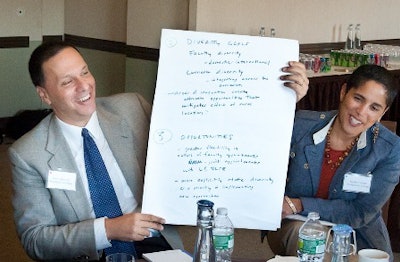 Dr. Ron Liebowitz, Middlebury College president, and Dr. Shirley Collado, dean of the college at Middlebury, at LADO’s Presidents Forum in September. (Photo by Lee Wexler)
Dr. Ron Liebowitz, Middlebury College president, and Dr. Shirley Collado, dean of the college at Middlebury, at LADO’s Presidents Forum in September. (Photo by Lee Wexler)Three renowned liberal arts colleges have announced the launch of a faculty diversity initiative that seeks a new paradigm for how liberal arts institutions interact with research universities on faculty development and recruitment.
Connecticut College, Middlebury College, and Williams College are spearheading the initiative, known as the Creating Connections Consortium, or C3, that “will implement strategies designed to accelerate the recruitment of students from historically underrepresented backgrounds into faculty positions.” The Andrew W. Mellon Foundation is supporting C3, which is targeting low-income, first-generation, and minority college students, with a $4.7 million grant over three years.
“We feel it’s a fresh and comprehensive approach to a large issue that we have found to be a challenge, especially in liberal arts colleges (and) also higher education at-large. It involves the attraction and retention of underrepresented faculty — a diverse faculty — with all the benefits that we’ve been missing in places like Middlebury and other residential liberal arts colleges,” says Dr. Ron Liebowitz, president of Middlebury College.
Initially, the three colleges will be working with Columbia University and the University of California at Berkeley on a number of tasks. Students, faculty and administrators from the 23 member colleges of the Liberal Arts Diversity Officers Organization (LADO) will participate in C3. The Center for Institutional and Social Change at the Columbia University Law School will help coordinate C3 activities and provide assessment strategies for the C3 colleges and their university partners. The center will also identify effective faculty recruitment and retention practices to help participating schools incorporate them into their institutional operations.
One component will be an annual event for undergraduate students from the 23 LADO colleges where they will learn about the graduate school experience at research universities and careers for those who earn doctorates. Another component will see the creation of research internships at the two universities for underrepresented students from the colleges. A third component will be the establishment of postdoctoral fellowships for new Ph.D.s to experience living and working at the liberal arts colleges. A fourth component will be a faculty exchange program among the C3 colleges and the university partners.
Liebowitz and other C3 school officials say that, while C3 addresses the fundamental challenge of increasing faculty diversity, the initiative is also taking on the challenge of convincing young scholars that they can have productive research careers at liberal arts colleges.
“We have an opportunity to reset the relationship between major research universities that produce professors and liberal arts colleges in the way they cooperate around probably the most important initiative in faculty hiring in the last decade, which is to find ways to provide much more robust and diverse faculty,” says Dr. Roger Brooks, the Connecticut College faculty dean and the Elie Wiesel Professor of Judaic Studies.
Negotiations among the LADO colleges and their research universities have been aimed at making their collaboration emphasize how liberal arts institutions can be an attractive and desirable option for young research scholars.
“There is a pervasive feeling in a lot of Research I departments at top universities that, if you go to a liberal arts institution, your research career ends; that the teaching is so heavy and that the time commitments are so great with undergraduates that you might cease being a scholar,” Liebowitz says.
“The Research (I schools) have an interest in us because we do have exceptional students and they would like them in their Ph.D. pipeline. We, of course, love their recent Ph.D.s, especially those who are underrepresented because we don’t have many,” Liebowitz notes. “We needed to start working together.”
Officials from the three lead colleges say a fourth liberal arts school will join the C3 leadership group in the second year of the grant. There’s an expectation that a third research university will join Columbia and UC-Berkeley as university partners by 2014.



















